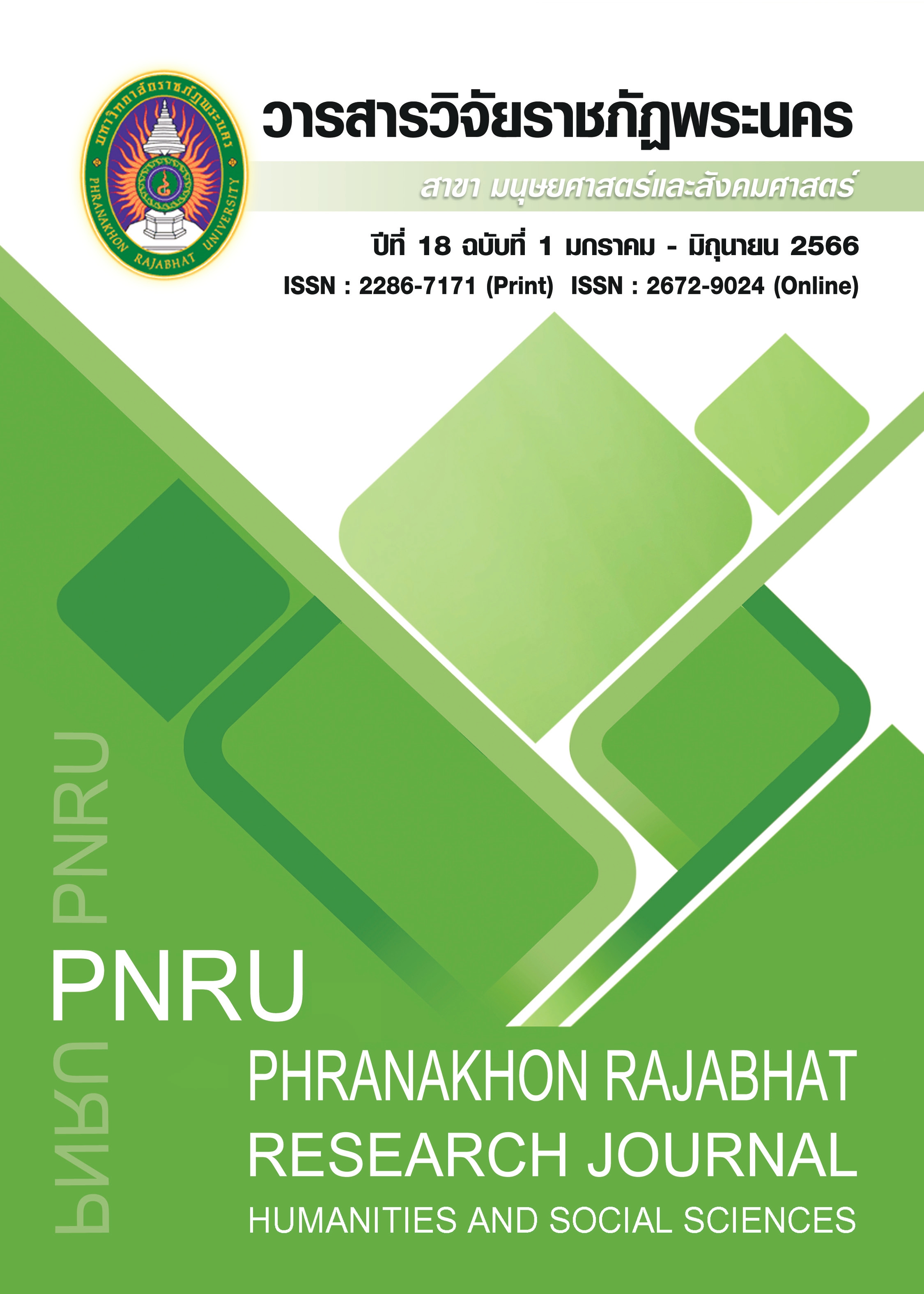FACTORS AFFECTING LEARNERS’ SATISFACTION WITH ONLINE ENGLISH TEACHING AND LEARNING DURING THE COVID-19 PANDEMIC: A CASE STUDY OF BUSINESS ENGLISH STUDENTS AT PHRANAKHON RAJABHAT UNIVERSITY
Main Article Content
Abstract
The COVID-19 pandemic has affected and transferred most teaching and learning around the world online. In Bangkok, Thailand, all classes have been conducted online since 2020 to support the government's epidemic control management. The drastic change has impacted learners’ learning through different online teaching strategies they are unfamiliar with. The present study investigated factors affecting learners’ satisfaction with online English teaching and learning during the COVID-19 pandemic among 109 Business English students at Phranakhon Rajabhat University, Bangkok, Thailand, using a set of 5-scaled questionnaires. This quantitative research administered the data analysis— descriptive and inferential statistics —through the IBM SPSS Statistics program, including the t-test, and One-Way ANOVA (f-test). Based on the research findings, the students had high average satisfaction levels in all aspects of learning success via electronic media or online lessons. When considering each aspect, the students had the highest satisfaction levels on the instructor factors, followed by the study location factors. According to the test of the hypotheses, the statistical findings indicated that the different students’ genders, college years, and residential styles while they were taking online classes resulted in different satisfaction levels in the significant mean at the 0.05 level with online English teaching and learning.
Article Details

This work is licensed under a Creative Commons Attribution-NonCommercial-NoDerivatives 4.0 International License.
Each publish articles were copyright by Phranakorn Rajabhat University
Any contents which appeared in each articles in the journal were authors personal opinion. It did not relate to Phranakorn Rajabhat University and other instructors in the university. Each authors would take responsibility on their articles. If there are any mistake, the authors will take responsibility themselves
References
AlHamid, S. (2020). Distance learning. Okaz Newspaper. Retrieved from https://www.okaz.com.sa/articles/people-voice/2034184 [2023, 8 Feb.]
Best, J., & Kahn, J.V. (2016). Research in Education (10th ed.). London: Pearson.
Chan, S.L., Lin, C.C. Chau, P.H., Takemura, N. Fung, J.T.C. (2021). Evaluating online learning engagement of nursing students. Nurse Education Today, 104, 104985, 1-7.
Chuairatchakan, S., Dathawi, P., Daengchat, C., Khlairung, K., Khutchuang, S., Thongmeesri, S. & Kamonrojsiri, P. (2022). The Satisfaction Towards Online Learning of Teacher Education College Students, Phranakhon Rajabhat University. Journal of Educational Research and Innovation Phranakhon Rajabhat University, 2(1), 1-17.
Collis, B. (1995). Anticipating the impact of multimedia in education: lessons from the literature. Computers in Adult Education and Training, 2(2).
Dziuban, C. D. & et al. (2004). Dr. Fox rocks: Student perceptions of excellent and poor college teaching. Unpublished manuscript, University of Central Florida.
Gautam, P. (2020). Advantages and Disadvantages of Online Learning. Retrieved from https://elearningindustry.com/advantages-and-disadvantages-online-learning [2023, 8 Feb.]
Gu, J. (2022). Impact of Living Conditions on Online Education: Evidence from China. Sustainability. 2022, 14, 3231.
Khabbaz, M., & Najjar, R. (2015). Moodle-based distance language learning strategies: An evaluation of technology in language classroom. International Journal of Applied Linguistics and English Literature, 4(4), 205-210.
Khasasin, R., Prachuabmoh, A., Khasasi, K., Rasmidatta, V. & Udomthanavong, S. (2021). Factors Affecting Online Teaching and Learning among Students Thai-Nichi Institute of Technology. Journal of Legal Entity Management and Local Innovation, 8, 237-252.
Kuama, S. & Intharaksa, U. (2015). Is Online Learning Suitable for All English Language Students? PASAA, 52, 53-82.
Malik, M.W. (2009). Student Satisfaction Towards E-Learning: Influential Role of Key Factors. Proceedings 2nd CBRC, Lahore, Pakistan.
Maneewonge, N. (2021). Students' Behaviors and Factors Achieving Online Teaching with Line Application During COVID-19. Journal of Educational Studies, 15, 161-163.
Nastasić, A. & et al. (2019). Student satisfaction as a performance indicator of higher education institutions. Mednarodno Inovativno Poslovanje, 11(2), 67–76.
Oraif. I. & Elyas, T. (2021). The Impact of COVID-19 on Learning: Investigating EFL Learners’ Engagement in Online Courses in Saudi Arabia. Education Sciences, 11, 1-19.
Pappas, C. (2015). Advantages And Possible Limitations of Online Learning. Retrieved from https://elearningindustry.com/advantages-and-possible-limitations-of-online-learning [2022, 2 Dec.]
Sangkasuth, S. & Trimek, J. (2021). Students’ Satisfaction towards Appropriate Online Teaching and Learning Models in the Epidemic of COVID-19 of Rangsit University. RSU National Research Conference 2021 on Social Science and Humanity, Education, Management, and Arts, 1-12. Pathum Thani, Rangsit University.
Simon, M. & Berg, A.G. (n.d.) Distance learning education. Retrieved from https://www.britannica.com/topic/distance-learning/Academic-issues-and-future-directions [2023, 8 Feb.]
Webster, J., & Hackley, P. (1997). Teaching effectiveness in technology-mediated distance learning. Academy of Management Journal, 40(6), 1282-1309.
Wong, W.H., Chapman, E. (2023). Student satisfaction and interaction in higher education. Higher Education, 85, 957–978. https://doi.org/10.1007/s10734-022-00874-0
Yang, J., Yu, H., Chen, S. & Huang, R. (2014). Strategies for smooth and effective cross-cultural online collaborative learning. Educational Technology & Society, 17(3), 208-221.


